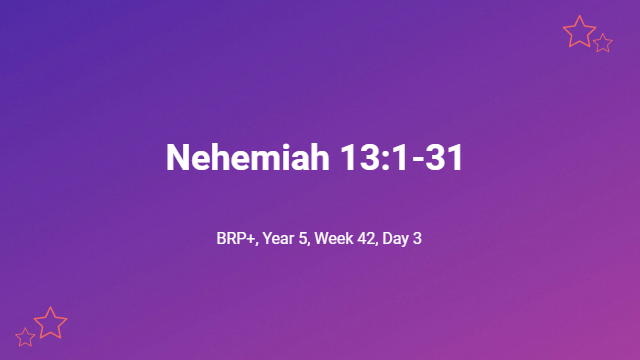Nehemiah 13:1-31
Q.1. Why were the Ammonites and Moabites excluded from the assembly of God? What evil had Eliashib done while Nehemiah was absent? How did Nehemiah react? – (Neh.13:1-9)
The dedication of the wall around Jerusalem had been an inspirational time. It concluded by reading the Scriptures … and there was found written in it that no Ammonite or Moabite should ever enter the assembly of God (Neh.13:1). Though God turned the enemies’ opposition into a blessing, two reasons were given for their exclusion – because they did not meet the sons of Israel with bread and water but hired Balaam against them to curse them … (Neh.13:2). So it was particularly odious to Nehemiah upon his return from Babylon that – prior to this, Eliashib the priest, who was appointed over the chambers of the house of our God, being related to Tobiah, had prepared a large room for him, where formerly they put the grain offerings, the frankincense, the utensils and the tithes of grain, wine and oil prescribed for the Levites, the singers and the gatekeepers, and the contributions for the priests (Neh.13:4-5). Tobiah was an Ammonite. Out of zeal for the Lord, Nehemiah – 8 … threw all of Tobiah’s household goods out of the room. 9 Then I gave an order and they cleansed the rooms; and I returned there the utensils of the house of God with the grain offerings and the frankincense (Neh.13:8-9). Nehemiah was a courageous leader.
Q.2. What flow-on affect did the misuse of the temple chambers have? How was this serious oversight corrected? Why did Nehemiah act as he did? – (Neh.13:10-14)
The chambers were reserved to collect the offerings, which enabled the Priests and Levites to function. The offering was taken up by an Ammonite, who was supposed to be excluded from the temple precinct – … so that the Levites and the singers who performed the service had gone away, each to his own field (Neh.13:10). Nehemiah called the Levites and singers back to their duties and encouraged Judah to bring their tithes to the storehouses. He appointed leaders over the storehouses – … for they were considered reliable, and it was their task to distribute to their kinsmen (Neh.13:13). Nehemiah’s recorded prayers indicate that he was motivated by his desire to please God (Neh.13:14).
Q.3. How was the Sabbath being abused? How did Nehemiah address this issue? What was behind his actions? – (Neh.13:15-22)
Judah also neglected the Sabbath, and it was no longer treated as the Lord’s Day. Many people broke the Sabbath. They worked and sold produce, even in Jerusalem (Neh.13:15). They even allowed foreigners to sell their merchandise in Jerusalem on the Sabbath (Neh.13:16). Nehemiah reacted strongly. He reminded the people that they were inviting God to bring wrath on the nation, because they abused the Sabbath (Neh.13:17-18). To stop these violations, Nehemiah commanded that the gates be shut until after the Sabbath. He also warned those who set up outside the walls of the city that he would disperse them by force (Neh.13:19-21). Nehemiah claimed the promised blessing of the Lord on his faithfulness (Neh.13:22).
Q.4. What was the problem with the Jewish men marrying women of the surrounding land? Why was Nehemiah so angry with them? How did he support the role of the priests? – (Neh.13:23-31)
Nehemiah also discovered that some of the Jews had intermarried with the surrounding Philistines, Ammonites, and Moabites. He was shocked that their children were not even able to speak the language of Judah (Neh.13:23-24). In his displeasure, Nehemiah pulled out the men’s hair, reminding them that despite God’s blessing on Solomon, – … nevertheless the foreign women caused even him to sin (Neh.13:26). Nehemiah was further shocked that – Even one of the sons of Joiada, the son of Eliashib the high priest, was a son-in-law of Sanballat the Horonite, so I drove him away from me (Neh.13:28). Upon his return to Jerusalem – I purified them from everything foreign and appointed duties for the priests and the Levites, each in his task (Neh.13:30). Nehemiah’s actions were prompted by his concern regarding the defilement of the priesthood, and their breaking of the Covenant (Neh.13:29). Nehemiah used all his authority, in order to lead the people to be faithful to God.

